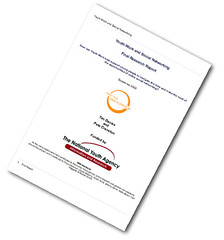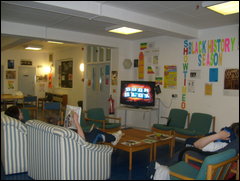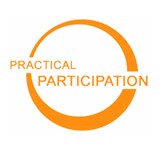This blog is now retired - and no new postings will be added here. However, you can continue to follow developments exploring Youth Work and Social Networks over in the Youth Work Online network, and via Tim Davies' blog.
DOWNLOAD THE FINAL REPORT
Research from a US Study shows that this sort of intervention can lead to young people changing the information on their profiles.
You can watch the presentation below, or see it along with the original sides on the Opportunity Links events blog.
danah writes:
The most important thing that we need are digital street workers. When I was in college, college students volunteered as street workers to help teens who were on the street find resources and help. They directed them to psychologists, doctors, and social workers. We need a program like this for the digital streets. We need college-aged young adults to troll the digital world looking out for teens who are in trouble and helping them seek help. We need online counselors who can work with minors to address their behavioral issues without forcing the minor to contend with parents or bureaucracy. We need online social workers that can connect with kids and help them understand their options.The Youth Work and Social Networking project came to a similar conclusion, although recognising that it need not only be college-aged adults, but any age youth work professionals with the skills and experience to offer support to young people in the online environment.
It's exactly the capacity to deliver this much needed online outreach and support to young people the report, and the follow up work we are developing, is seeking to catalyse and develop.
Katie has just posted a video over on the Youth Work Online network where she shares an update on progress in Devon, and offers key tips to anyone else who wants to get started using Social Network sites in their youth work.
Find more videos like this on Youth Work Online
Cross posted from Tim's Blog
If you prefer listening to a presentation over reading a report (PDF) - then you can catch some of the key learning from the Youth Work and Social Networking project in this video from Tim speaking at the Wise Kids conference in Swansea during October.

You can find the Video here. Choose 'Workshop B' from the Playlist, and then select the presentation labelled 'Tim Davies' to watch.
This video also introduces a new way of looking at the workforce development aspect of the Youth Work and Social Networking final report - exploring different youth work responses to Social Network Sites through the stories of four different youth workers.
 Just a quick post to let you know that you can now download the final report of the Youth Work and Social Networking report here:
Just a quick post to let you know that you can now download the final report of the Youth Work and Social Networking report here:- An overview of how young people are using online social networking;
- A survey of the opportunities and risks created by online social networking;
- A youth work perspective on online social networking - making the case for a youth work role engaging with online social networking and providing a brief theoretical foundation for that.
- Practical steps for youth work engagement with online social networking - including an outline policy checklist and a proposed model for staff training.
I have a concern for misinterpretation by adults over reacting to young people views and opinions. In my observations and experience we tend to hear and listen selectively however, with written evidence of dialogues and opinions of young people there is the possibility of adults over reacting.
There needs to be clear consultation, debate and discussion with young people and adults about how the policy and framework will guide young people and practitioners on how to respond to issues of clear inappropriate comments are being submitted - young person/group submitting sexually explicit words, abusive language, racists comments, homophonic comments.
I would anticipate that once comments are removed that an appropriate identified practitioner would contact the young person/group and review the situation facilitating discussion, reflection and learning about their views/opinions and the repercussions on others and themselves. There is a necessity to promote reflective and critical thinking amongst young people but also adults!
Understanding how to read young people's contributions to online discussions is definitely going to be an important part of any participation work... and as Katie suggests - it involves a developing of literacies for both young people and adults.

Youth Work and Social Media – Research launch
Friday 26 September 2008
14.45-16.45
Mary Ward House, 5-7 Tavistock Place, London, WC1H 9SN
Online social networking, most commonly associated with Social Network Sites like MySpace, Facebook and Bebo, is a growing and significant phenomenon and part of many young people’s lives.
The National Youth Agency has been carrying out research into the role that Youth Work can play in supporting young people to make the most of the opportunities afforded by online social networking, as well as navigate the potential risks involved. An interim report on this work is available here
We are pleased to invite you to a free event to launch the final research report at Mary Ward House on Friday 26th September, from 2.45 pm. Refreshments will be available on arrival. Directions to the venue are available here
Delegates will hear a presentation from Tim Davies and Pete Cranston, the report’s authors, which will address:
- An overview of the literature on the opportunities and risks of online social networking, the data on how young people are engaging with online social networking, and the efficacy of the different strategies for supporting young people's safe and effective engagement with online social networking tools and spaces;
- Findings about the current levels of engagement with online social networking tools within the youth work workforce - from both an online survey and focus group research;
- The findings of three action research pilots looking at: developing policies to safe local authority engagement with social networking sites for youth participation; training for youth workers and youth professionals to be able to support young people to be safe in online social networking spaces; and using online social networking spaces to promote services to young people.
The presentation will cover practical steps that youth services can take to address social networking and open discussion will follow.
If you would like to attend this free event please respond to ritak@nya.org.uk with your:
Name:
Job Title:
Email address:
Contact telephone number:
Spaces are limited so we would advise early booking.
Delegates may also be interested in two other events running immediately before and after this one.
- The Local Government information Unit is running a good practice seminar on social networking and youth participation at the same venue immediately prior to this research launch, at a cost of £110 plus VAT. For more details, see the LGiU website
- On Saturday 27th September, The UK Youth Online conference is a free co-created event for anyone with an interest in how technology impacts upon, or can be used in, work with under 18s – for more details, see the UK Youth Online website
 Gillian Elliott is an Area Youth Worker at the Blackbird
Leys Youth Centre in
Gillian Elliott is an Area Youth Worker at the Blackbird
Leys Youth Centre in
Gillian is an experienced youth worker who has recently
taken over the centre and working energetically to develop it. She joined the
Action Research project to explore how Social Networking could supplement
traditional youth work activities. Her aims were to build staff capacity, starting with herself, promote the
centre and provide an additional channel for communication with young people,
both as a group and individually.
With strong support
from Jeremy Dennis, Oxfordshire County Council Youth Support Services web
Editor, Gillian set up both a Bebo and Facebook profile, although it was soon
clear that Bebo was the more promising site for the users. BBL Youth Centre Bebo profile The young people were interested and
several befriended the site, although they weren’t initially keen to edit or
contribute to it – preferring rather to comment on the work done by Gillian and
Jeremy. Importantly, the majority of youth club members don't have
access to computers at home and instead use the computers at friend's houses
and sometimes school. There have been delays in getting the two machines
ordered for the centre so access was provided through a two hour session at the
local IT hub in the same building.
Reviewing progress three months on Gillian feels she isn’t yet using it as she would wish. This is partly because of the limited access to machines which means that young people tend to use the time for immediate personal communications, MSN and email. Time is the other constraint, with Gillian fully busy developing and running the centre. A work experience student jazzed up the Bebo site and Gillian is planning to continue that support through engaging one of the new staff joining the centre (as a part of a pilot on weekend opening). The site needs to become proactive, posting pictures and films of the group although many member’s immediate reaction has been to, “shout and scream and say they don’t want pictures on the web”.
Once the two machines are installed Gillian plans to allow members “open and easy access” so they can come in and use it regularly. Her biggest hope from Social Networking is easier communication. She is clear though that a Youth Work approach is essential. “It’s the same as youth work on the face to face level, you – I – need to build a relationship through the site to a user group”

